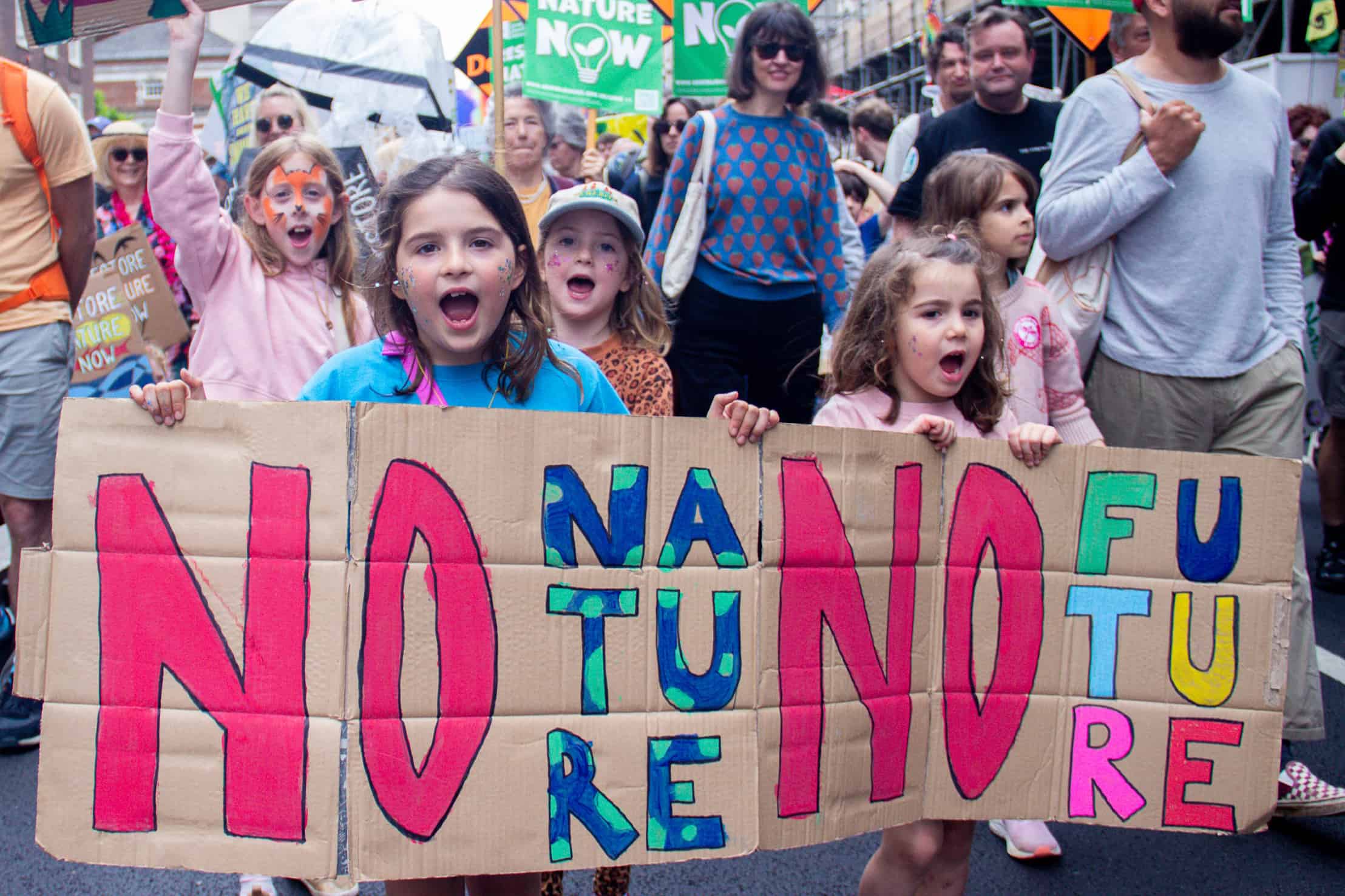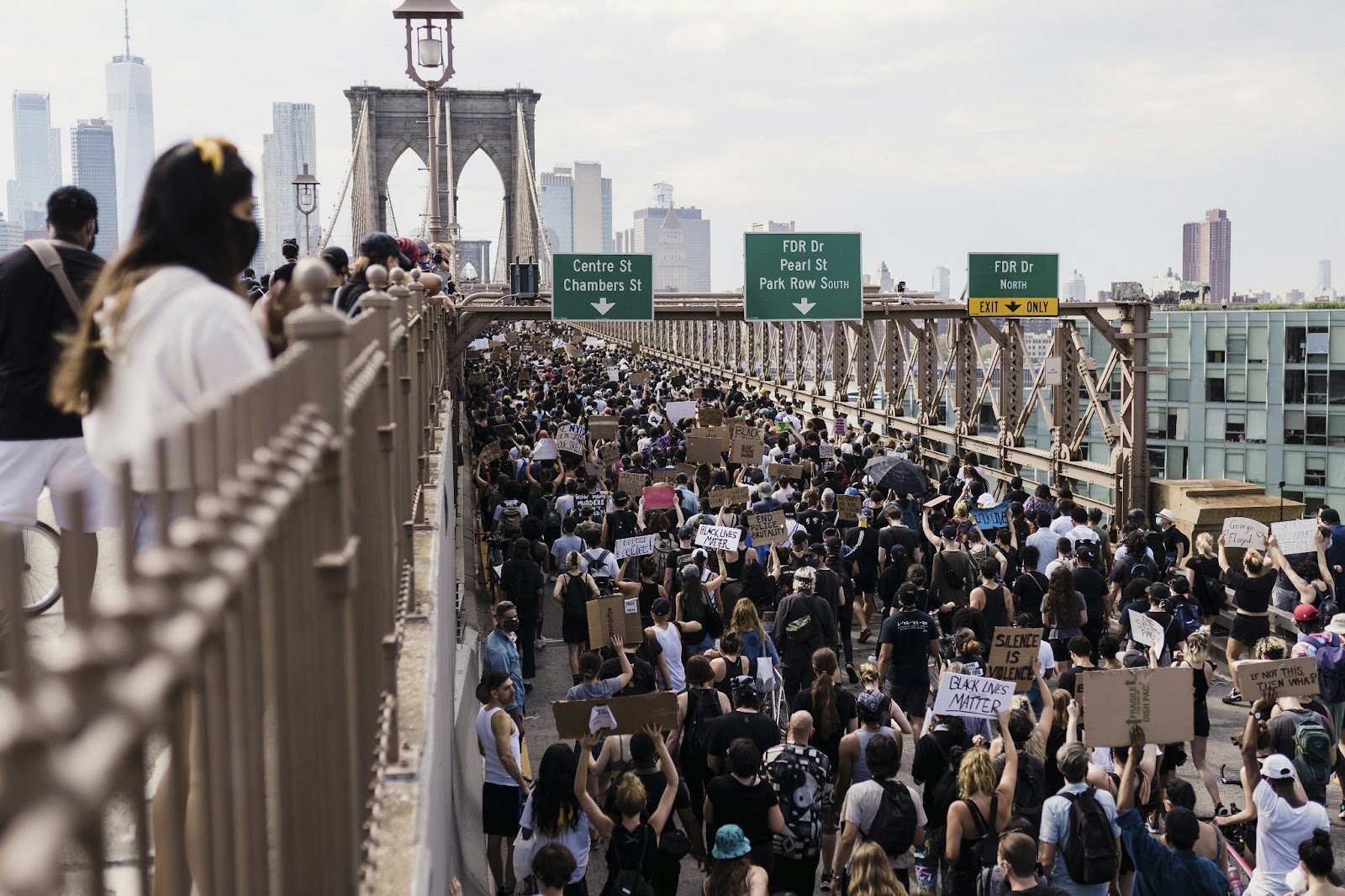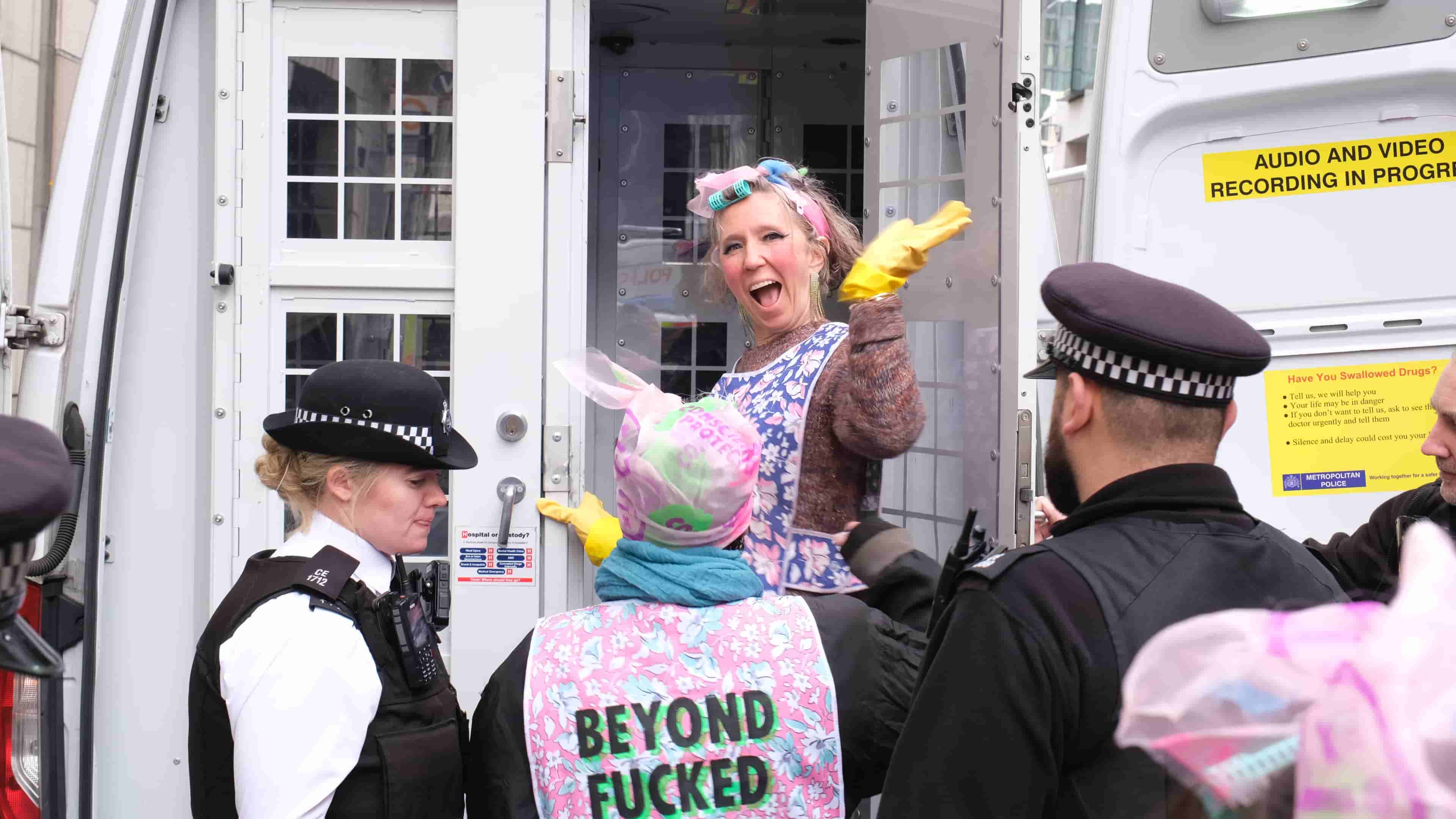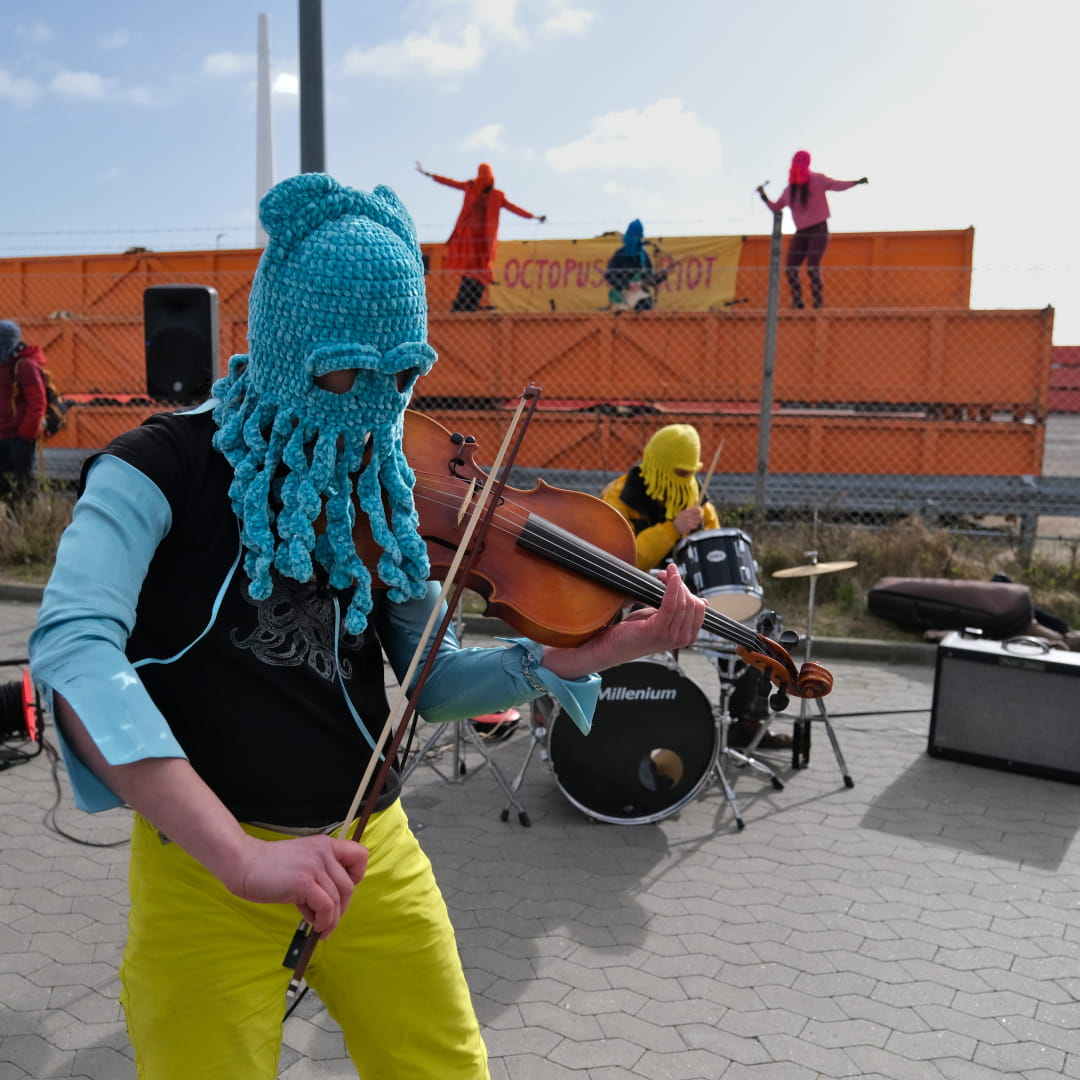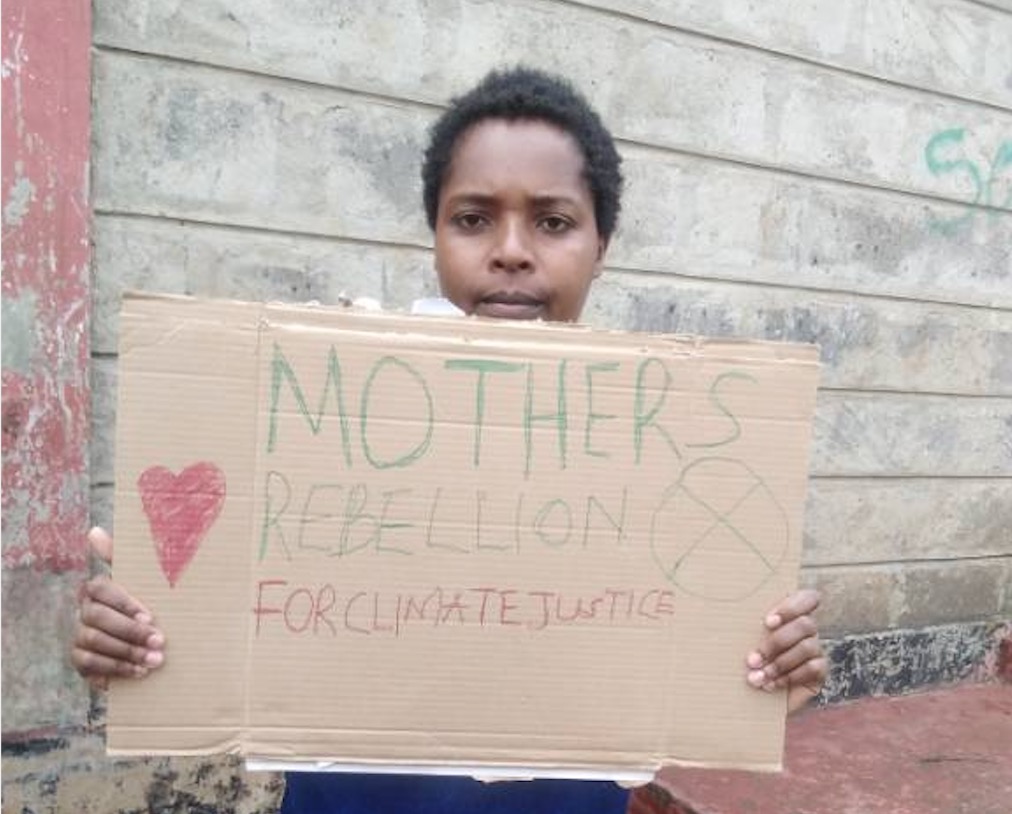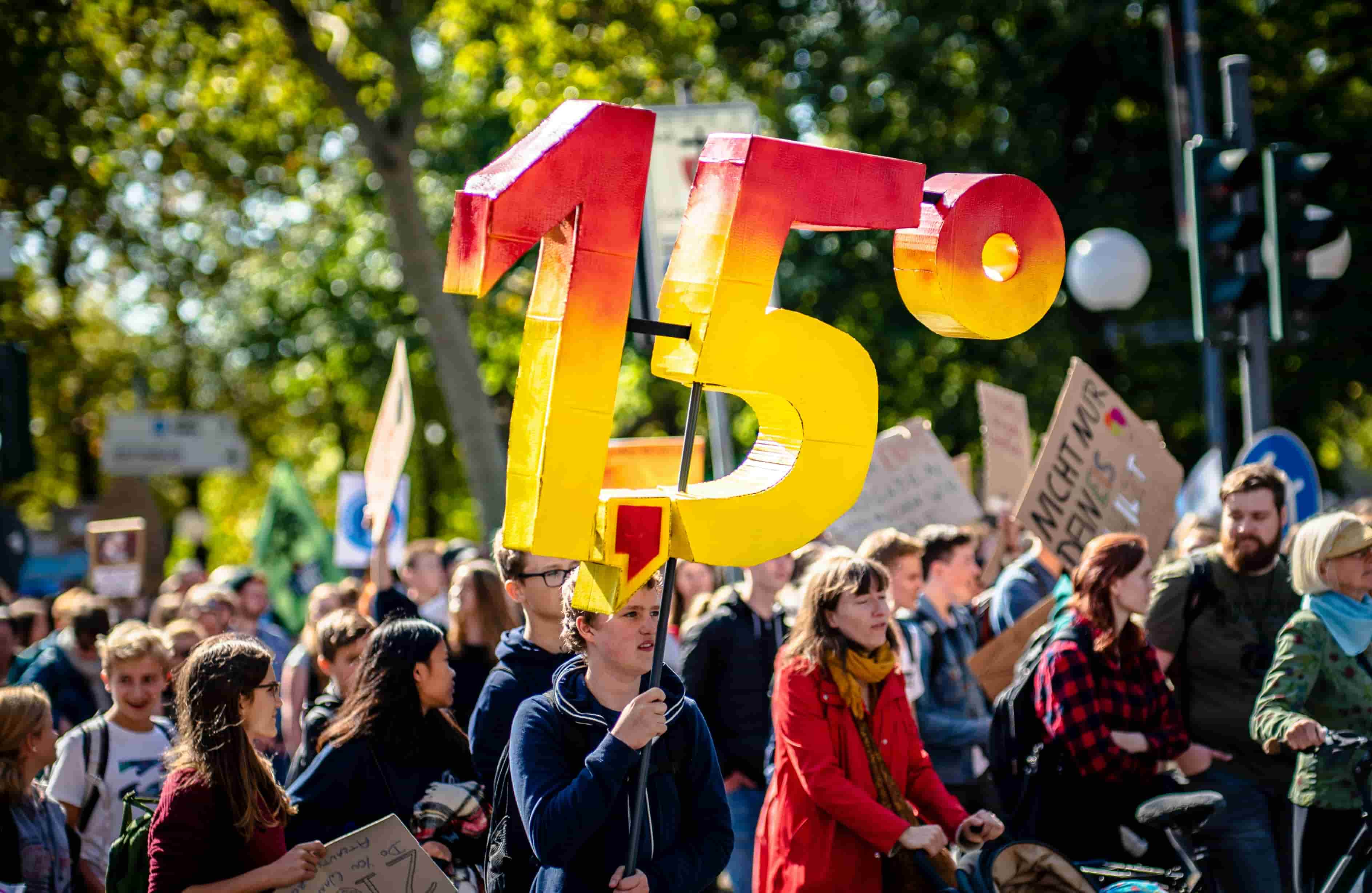Charles Curtin has made a career of thinking outside the box, of paying attention to the local and indigenous people government agencies and large conservation groups alike tend to ignore, of looking at big places and long time-scales without seeking an easier, simpler way out. He has a habit of issuing rather koan-ish one-liners, among them 'don’t be the kind of expert who talks; be the kind of expert who listens.'
While there are obvious differences between what he does and what XR does, there are also parallels, particularly in his conviction that climate change is inherently a social justice issue. But while Extinction Rebellion is very much a newcomer, he’s been at it for some thirty years now. He’s seen what works—and what doesn’t.
Charles is also my friend, though I hadn’t had an opportunity to see him in a while. When I asked if he’d be willing to offer us a few tips for going forward, I was glad he said yes.
I have, with his permission, edited his words for length and clarity.
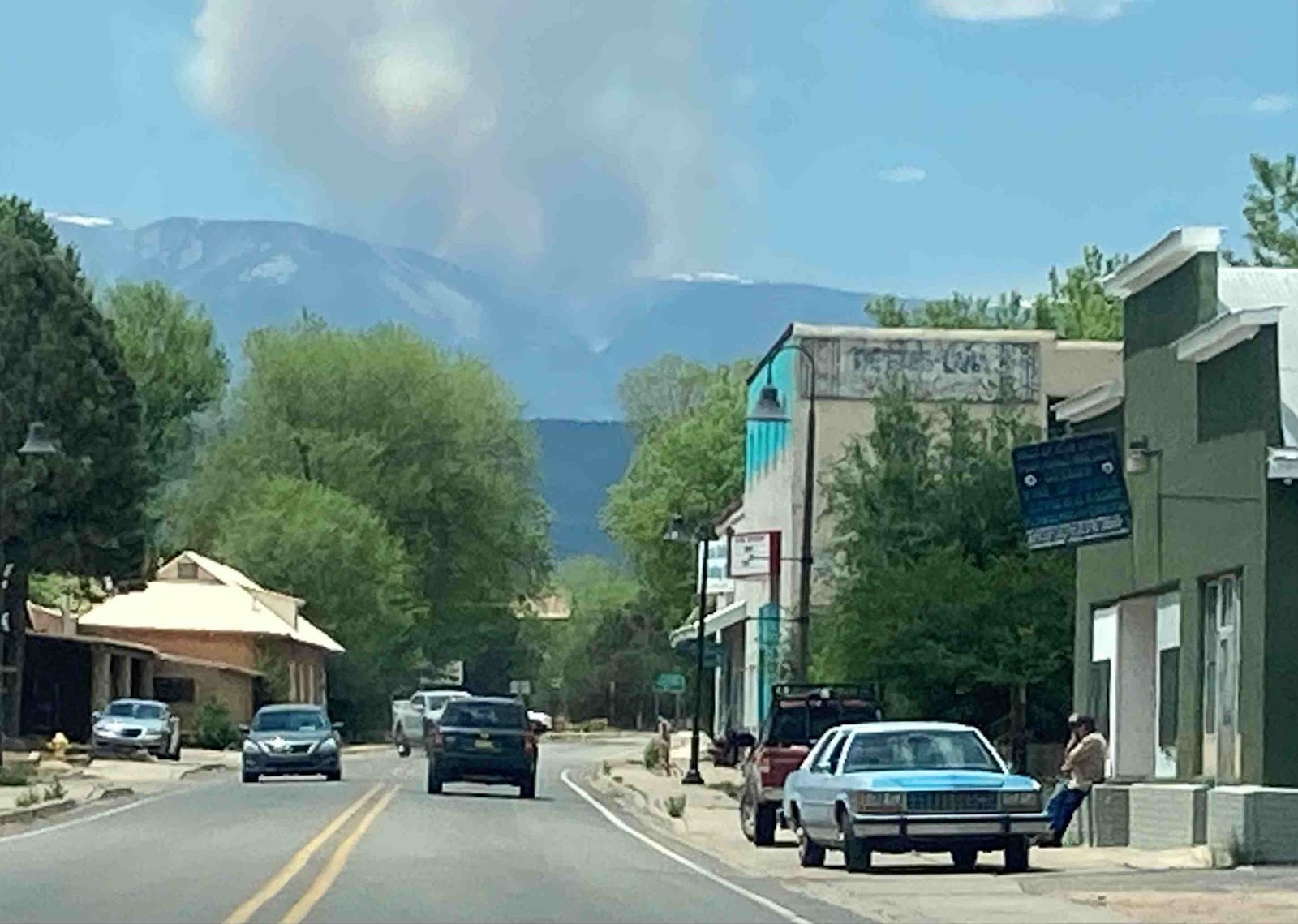
A rural community in New Mexico with fire impacts looming. Photo provided by Charles Curtin
Charles is an ecologist, a conservationist, and a writer. He specialises in finding ways for rural, often disenfranchised communities to protect their own land—he has been involved in projects that saved millions of acres (an acre is almost half a hectare, but either way, lots of land). His current work centres on his home in the Mora Valley, a remote Hispaño enclave in New Mexico, where he has formed an organisation called the Sangre de Cristo Mountain Initiative to address three regional crises at once: the land needs restoration after decades of mismanagement, but there is no money to pay for the work; there is little economic opportunity for young people, most of whom simply leave; and, of course, there is climate change. Charles and his colleagues are trying to launch a sustainable business venture meant to make habitat restoration economically viable while providing badly-needed jobs for local people and sequestering carbon.
The project was just finding its legs when a monstrous wildfire ripped through the region, leaving behind a great deal of damage and a thin, but very real, chance to do a whole lot of unexpected good.
I should make clear that although Charles speaks of Extinction Rebellion with respect, he is not himself a rebel. Nothing we do should be seen as reflecting on him, nor are his opinions necessarily those of XR.
The Conversation
I initiate the Zoom call on a January afternoon and there he is, older but otherwise the same as ever, in an avocado-coloured fleece jacket, seated in what looks like a back hallway. Sunlight streams in from one door. Colourful, woven rugs adorn the walls. We spend some minutes discussing those rugs and getting reacquainted. Behind me, he can see my wood-stove, a framed wedding photo, and the lights of our Yule-tree reflected on the window-pane as the daylight fades to black outside. We are speaking across time-zones.
Zoom is so strange, offering us these glimpses into each others’ places, each others’ lives, but only so far as the camera can see. Beyond that, nothing.
He has been following XR in the news and remarks that 'they think deeper than the old Earth First! groups. They’re a generation beyond, thirty years later, and there’s more sophistication to how they’re conceptualising it.' Then he laughs a little self-consciously.
He asks why I want to interview him. I tell him about that even though we’re a protest movement and he’s not, we have a lot in common. I give him a few examples. I mention our efforts to avoid Eurocentrism, knowing how he, a white and relatively privileged American, does the same. He interrupts me, commenting that a lot of environmental groups don’t want to get involved with forestry or anything related to it.
'And I’m like, well, wait a minute, we’ve got three hundred, four hundred years of culture here that was based on forestry, on sawing down trees and killing animals, whether you’re talking about the Pueblos or the Hispaño people. So do you judge, do you say, oh, I’m a vegan, I don’t believe in what those Pueblo people did for the last thousand years? Or do you have some sort of common ground?'
He says he’s glad we’re grappling with this, that most environmental organisations are too urban and don’t pay enough attention to rural and indigenous peoples.
On to the questions (in bold and italics).
'Conservation is done by people, right? So ultimately it’s about building human relationships. And anything that disturbs human relationships, disturbs bonds, is not a good thing.'
When Charles writes about environmental conservation, he’s usually not discussing scientific study design or natural history. Instead, he’s writing about how to work with people—and what goes wrong when conservationists fail to collaborate with various stakeholders. He has said 'it’s not about conserving the land—it’s about conserving the communities that conserve the land.'
Well, XR isn’t organising land trusts, but our work certainly depends on collaboration. I started out with a couple of questions about the art of dealing with people.
You’ve written about how environmental organisations and government agencies often try to help local communities but hurt them instead. How can XR, going forward, avoid falling into some of the traditional mistakes?
'Interesting,' he murmurs, looking away from the camera a moment to collect his words.
'Yeah, one of the first things, of course, is to address any situation you enter into with humility, right? To listen and look. Just listen, just watch what’s going on.'
As he speaks, he talks with his hands, though not to excess. His face is impassive, professional, disclosing almost nothing of the personal—except interest or, not infrequently, a hint of secret irony.
'Years ago, we were doing these exchanges between [American] ranchers and the Maasai, and we really had to bite our lip, not say anything. We’d so often want to guide the conversation. That’s the hardest thing with a large organisation, you know—time is money, the clock is ticking, you want to get a lot of things done, and donors are impatient. But it’s almost a direct relationship, the more time you invest up-front, the more durable the outcomes are. A lot of it is simply be engaged.
'I really found I need to live in the communities I work in. As you know, I used to work with fishing communities off the coast of Maine, where the most important information I got was not a formal interview, but I’d be on the ferry in a storm, on the back deck, and the waves would be rolling by, and a fisherman would saunter up to me and say, you know, I’ve got an idea.'
Quoting the fisherman, he speaks in character, becoming, for a moment, the weather-beaten worker he knew.
'Or—I have to laugh—in Montana, one time I closed the local bar [stayed until closing] five nights in a row—and I don’t really drink, but that’s the way you meet people, and after two or three beers, a rancher comes up to me and says you know, I’ve been thinkin’ about….
'Or, at the moment, I’m one of the few what they call Anglos in a community of mostly Indigenous and Hispaño people. It’s about showing up, being accessible, and that just takes time. So, yeah, humility and patience is what a lot of it boils down to.'
And he swivels in his chair a bit, patiently awaiting my next question.
You’ve done a lot of work with ranchers [who tend to have an adversarial relationship with environmentalists] and others who disagree with you or each other about major things. How do you find common cause?
'Ok, well, the Blackfoot Challenge [an organisation] I worked with in Montana for a while, had a wonderful saying, the 80/20 rule. I found it remarkably accurate—most people agree on 80% of things. We love our children. We value our parents. So you really focus on the 80% you agree on, not the 20% you don’t. Now, how that plays out in terms of details may differ, but I’ve been amazed how, when you put politics aside, how things really change.
'A lot of the ranchers we work with tend to be conservative. I think, at one point, everyone I worked with was a strong Trump supporter. But we didn’t talk about Trump. We talked about, you know, what we cared about in the environment, why we wanted to change things, what we agreed upon. So that’s the main thing, focus on what you agree on, what you can do something about, not on what you don’t.
'I mean, one of my closest partners right now is a Trump supporter. I don’t need to prove him wrong or prove me right. He gets where I’m coming from, I get where he’s coming from, and the irony is his values are very similar to mine, they’re just expressed differently because he listens to different press, has a different context in which he views things, but the values are the same. So that’s the main thing, not to get into judgement, not dwelling on differences, looking for common ground. Years ago, we had a bunch of US State Department-supported projects in the Middle East between Israelis and Palestinians where, once again, you focus on the common ground. You care about the land, you care about your children, you care about your community—we don’t need to debate religion. It kinda works across the board.'
Sounds easier said than done. How do you tell what is common ground versus what you maybe shouldn’t talk about?
An amused shadow pulls at his face for a moment. Charles likes clever, surprising insights, simple ideas that are far from obvious and yet make all the difference in the world. Apparently, this thing about bridging differences qualifies. But he answers a slightly different question than the one I asked.
'The Blackfoot Challenge used to talk about pacing. There’s a timing to things. To give you an example, I was doing this joint project between Palestinians and Israelis and then American conservationists about ten or twelve years ago. At one point, some of us mentioned what seemed like a simple question about power dynamics or something, and all of a sudden it was like the flood-gates opened. These groups had been together for months, and they finally felt they were in a safe space to go to the next level and really talk about the gorilla in the room, which was their faith and the power relationships in the Middle East.
'Right now, I’m with my [business] partner who’s a Trump supporter—we can talk about it, we can agree to disagree, and so now, after several years, he might say something and I go, you know, I don’t really buy that and this is why, and he can say, well, I’ve heard this and this is why, So we can have that dialogue, but we don’t start out with that. So yeah, I think there’s a time and place, and it’s necessary, but you’re deepening the relationship.
'Again, to me, conservation is done by people, right? So ultimately it’s about building human relationships. And anything that disturbs human relationships, disturbs bonds, is not a good thing. And so it means being right about some political point is irrelevant. It’s a matter of thinking about what are those big needs out there? And recognize that if we’re collectively able to save a million acres, does it really matter if the guy next to me votes differently? Nah, it doesn’t.'
I should point out that what Charles is saying here needs to be read with some nuance, as sometimes votes and political disagreements can matter very much—the point is that they don’t matter to those million acres. When a house is on fire, firefighters don’t stop to argue politics or moral philosophy, they work together to put the fire out.
I comment that Charles is wise, and he glances away, chuckling, embarrassed.
'Well, it takes patience because you’re taught to, you know, get in there and stand up for yourself, but you gotta take the big picture, you know, what is your end goal? What are you after? And being right is not it. Everyone’s gotta give a little bit.'
'I more and more believe that almost all politics is local, almost all empowerment is local, so it’s about empowering local people and giving them a voice, recognizing that policy crafted at the Federal level, it’s a blunt instrument. It doesn’t deal with the nuances.'
You, like XR, do a lot of work with communities that don’t have much support through normal government channels and big organisations. Can you speak to that process, to supporting communities coming together and building their own capacity?
'Yeah, no, it’s an interesting point,' he begins. 'One of the things you realise, is that—and I say this as a liberal, white, North American—a lot of government policies don’t really apply to rural communities. So I can see why communities get agitated, I can see why they gravitate towards…. I live in a community of 600 people. The schools are marginal at best. We have almost no healthcare. This is America’s outback. And you can understand why people are suspicious.'
He looks down and fidgets with his hands a moment and frowns, bothered, before making eye contact with the camera again to speak.
'I wrote an article recently about people here in New Mexico—you know, we had these large fires here, with thousands of firefighters—but you have to understand the optics from the view of this village, this remote, Hispanic village. The last time the Feds [forces commanded by the Federal government] showed up in force, it was during the Pueblo Revolt in 1847 when the Seventh Cavalry shelled the place and burned it to the ground. And people have not forgotten that. I mean, that’s their experience of the Federal government. They are guys who steal children and bring them to language schools. They are people who shell communities. They’re the people who steal land. And so it’s a very different optic. So one of the reasons I like to live here is that, for North America, it’s probably closer to what other people experience in other parts of the globe. But again, it means people, if they’re gonna get empowered and get engaged, they’ve gotta do it themselves.
'And even though the politicos show up, and they do their dog-and-pony show, and they give, uh, refrigerators to poor people and various things, they don’t really get it. I guess where I’m going is that ultimately, empowerment is built locally. Even though I began my career in Washington DC doing policy at a Federal level, and yeah, there’s a lot you can accomplish that way, I more and more believe that almost all politics is local, almost all empowerment is local, so it’s about empowering local people and giving them a voice, recognizing that policy crafted at the Federal level, it’s a blunt instrument. It doesn’t deal with the nuances.'
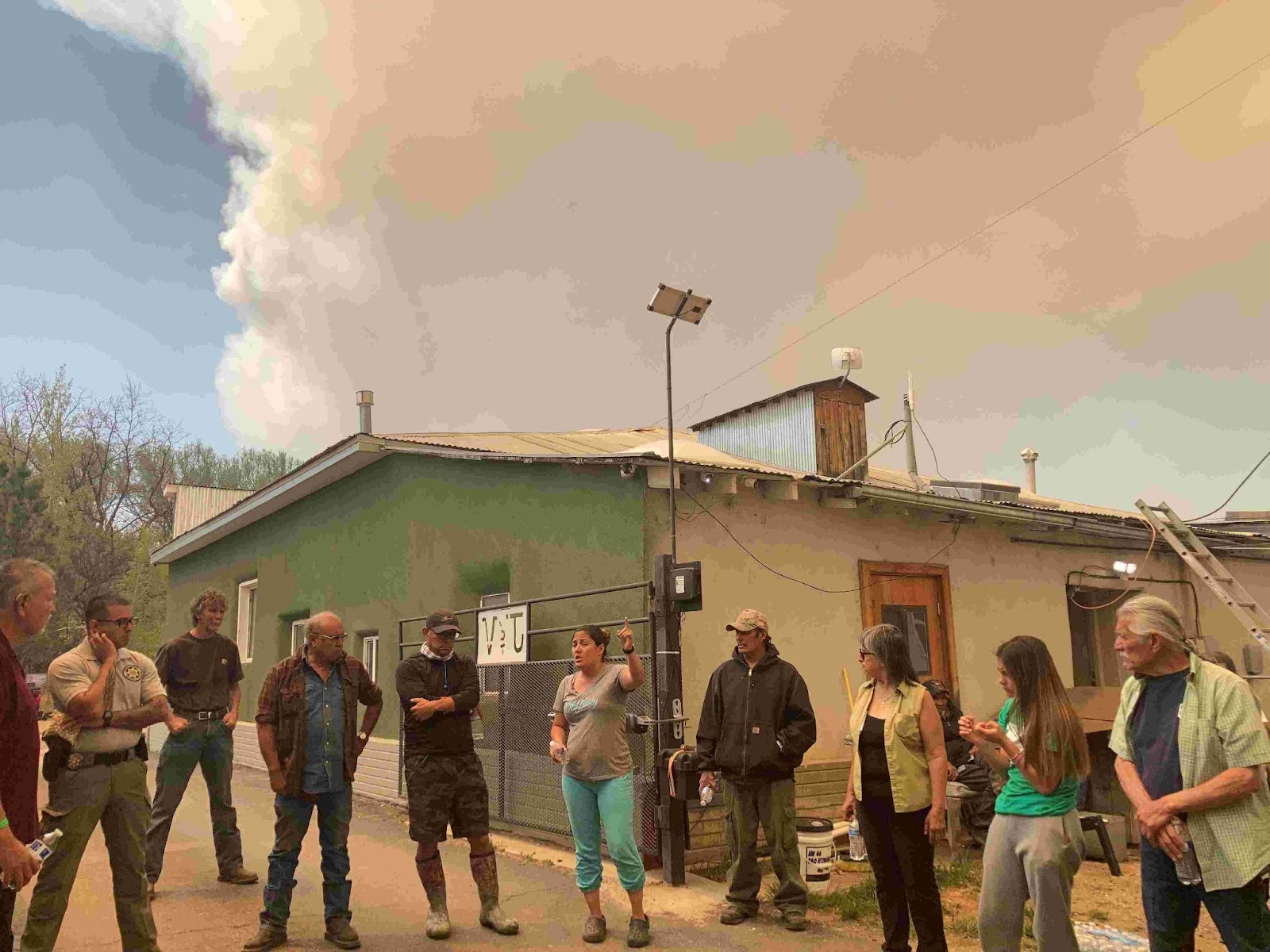
Residents of Mora Valley challenge state and federal actions as smoke from a nearby wildfire looms. Photo provided by Charles Curtin
He talks at length about how the aid his neighbours are getting in the aftermath of the wildfires doesn’t actually meet their real needs because the aid program is based on an inappropriate, one-size-fits-all approach. He mentions that where he comes from, back in rural Wisconsin, was in some ways similar to the community he lives in now, though his family’s background was somewhat different.
'In general, if you’re dealing with rural communities, they’re all different, and they’re all kinda the same.
'Again, conservation is intrinsically a civil rights issue. It’s intrinsically a social justice issue, and that’s where it dove-tails, because if you’re not paying attention to the needs of other people, it’s not going to work, at least not sustainably.'
'Hundreds of years of lifeway are at stake. Fire is the new reality no one is talking about.'
The wildfire that Charles is talking about is the one I mentioned in the introduction—the Calf Canyon Fire, which was both the biggest, most destructive wildfire in New Mexico history and the largest wildfire of its year—2022—in the Continental United States. The fire burned a total of 138,188 hectares and was exactly the kind of disaster we can expect to see more of with climate change. It seems a good segue to a series of questions about an ecologist’s view of our changing climate.
Was the fire a 'OK, climate change is personal now' moment for the people in your community?
'How interesting,' he says yet again, and sounds as if he means it, probably high praise from a scientist. He then refers to an Aldo Leopold quote about ecologists living in a world of wounds. He admits he can’t remember the rest, then adds 'the point was that people are blind.'
Curiously, that’s not the point I’d draw from the quote, which is 'One of the penalties of an ecological education is that one lives alone in a world of wounds.' To me, the quote speaks to what it’s like to be an ecologist—but Charles has never been interested in talking about what it’s like to be him. That other people aren’t aware of the wounds, and why they aren’t aware, is far more important to him.
'I find it amazing that even in many rural communities like mine, where people are so tied to the land and have been for centuries, the lack of awareness of forest health and fire threat is stunning. For example, our forests are, on average, a hundred times historic densities because of over a century of fire suppression. The problem is most people in our area have never seen a healthy forest so they don’t understand how out of whack the whole system is….
'So, with all the extra biomass on the land, wildfire was an accident waiting to happen. I was meeting with the county supervisors the day before the fire, and they said we don’t have an issue, and then the next day they had to evacuate. People sometimes think we’re inoculated now, and we’re not. What people don’t realise is that due to climate change, after seven years, the odds of having a reburn are just as great as if you hadn’t had a fire. We’ve got a very brief window to thin our forests and restore ecological health to avert another big fire—and yet at all levels of political leadership there’s a culture of denial and a focus on quick fixes rather than lasting solutions. So people from our political leaders on down do not get that it is not about repairing roads or fixing fences [after] last year’s fire. Hundreds of years of lifeway are at stake. Fire is the new reality no one is talking about.
'Cause the reality is for most rural communities, it’s kind of the beginning of the end when they have a major fire. Because the lifeways do change. They can’t raise their cattle, so people leave, they take buy-outs from outside investors, and so it’s really a struggle to make people aware of something that isn’t even on their radar. So a lot of my writing is about what’s really at stake here. Particularly to make the politicos realise that no, it’s not about giving people a bag of rice or hay for their cows, it’s much bigger than that! And it’s not just here in New Mexico but across the West—this is the new normal, this is permanent. Fire that transforms communities becomes more and more the norm, and how do we deal with that?'
He smiles, suddenly self-conscious, and says he’ll stop there. He reaches for, and takes a drink from, what has to be the world’s largest and yellowest tea-cup. Or perhaps it is a soup-bowl. In either case, it sounds like he has just realised he’s been talking too much—but he hasn’t been talking too much. He has been speaking across a wide range of interrelated subjects without quite answering my question, or perhaps he has answered my question but also several other questions which I didn’t ask but which seem connected.
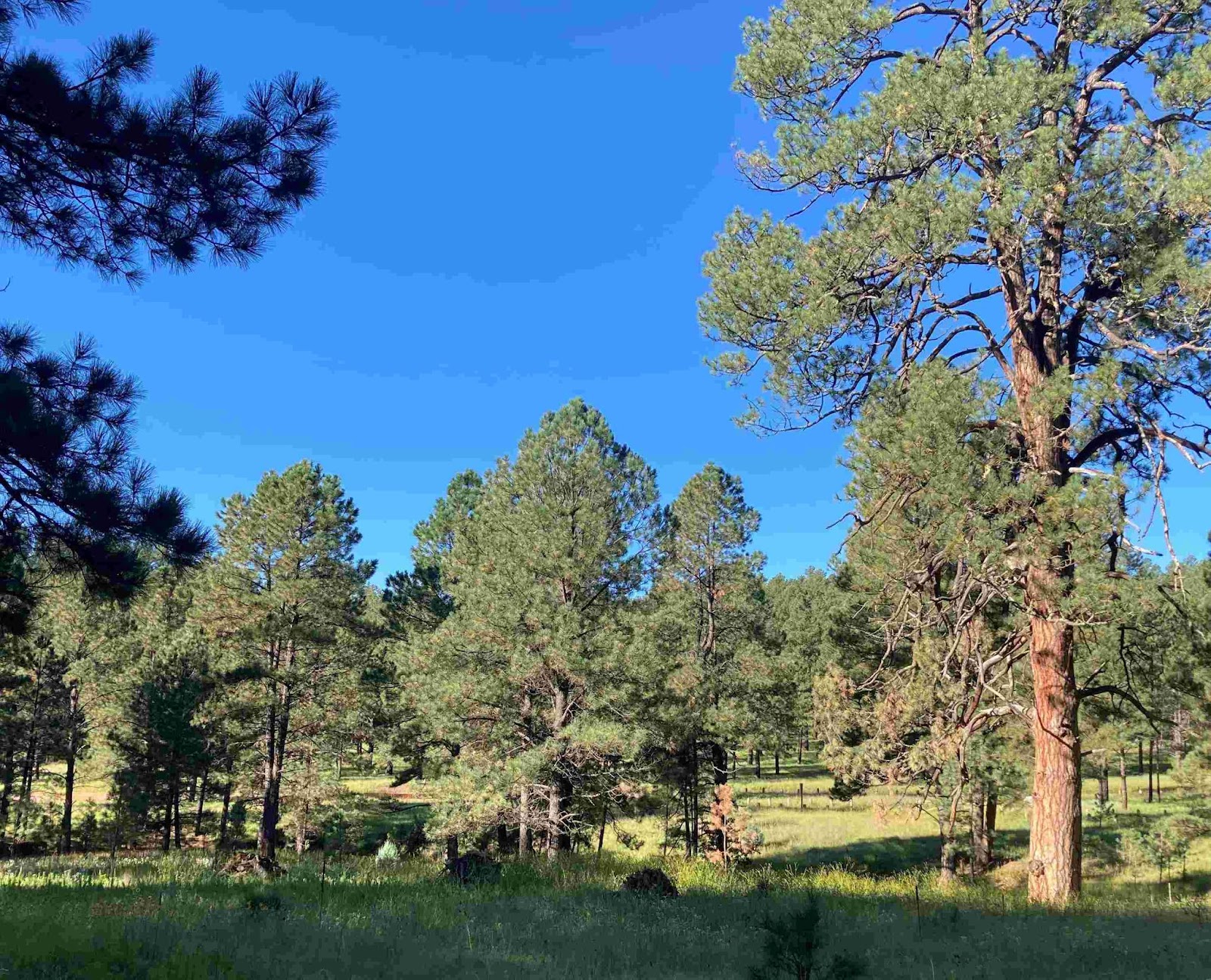
What a healthy Southwestern forest looks like. Note the grassy understory and the widely-spaced trees of varying ages. Photo provided by Charles Curtin
Charles speaks, when he’s not uttering pithy, Zen-ish one-liners, in first-draft essays, the sort of meandering thing that might prompt me, as an editor, to say tighten this up, focus on one point. Topic statement, supporting statements, boom, boom, boom! The really funny thing is the necessity of focus is something I learned from him. But nobody speaks in edited, polished essays, and anyway, sticking to a single, well-defined topic is exactly what his work doesn’t do.
Because what topic do you stick to? Climate change? Fire ecology? Economic development? Human rights? No, you can’t, because they’re all interwoven. So he doesn’t.
So the fire didn’t wake people up?
'I think it woke people up a little bit, but they really think well, that’s passed and now we’ll get back to normal life. But the reality is life hasn’t been as normal for decades, we just got lucky—until eight months ago.
'But another way to put it is there’s opportunity, right? We had a very sick forest, as I said, a hundred times the historical stand density, an ecological wasteland with a fraction of the biodiversity that should be here—dense, dense overstory, nothing in the understory, like a dead-zone for wildlife, when historically our forests were grasslands, rich, luxurious grasslands with trees sticking up here and there. Savannas with trees. And so we’ve got a reset, we’ve got an opportunity now to get back to where our landscape was a century ago. But the other thing is that we have evidence that in another century or so, we’re not going to have forests like we have now, they’re not going to regrow, it’s getting too hot and dry for them. We’re seeing tree die-offs already. So how can we design that future—we can plant trees that are more drought tolerant, we can change our way of thinking, because we’re not going back to where we were, that’s not going to happen.'
Charles explains how, because of various unusual circumstances, there happens to be a lot of Federal funding available for recovery in this case. His proposed project predates the fire, but if re-framed and adapted to include salvaging dead wood, it may be able to receive a good chunk of that recovery money and use it to scale up.
'So there’s a lot of opportunity there, the question is are people going to take advantage of that? So a lot of my conservation work has been trying to re-think—we’ve been trying to do large landscape restoration for years, and we’ve been fighting for a few dollars here and there. Now we’ve got millions of dollars flowing into this landscape—can we harness it, can we use it wisely, or will we just return to the status quo? Not many people get that, even in this very savvy community. They’re still looking at what they lost, not where the opportunity is. Because the fire would have happened sooner or later anyway.'
I remember the importance of forest-thinning in the American Southwest, in Arizona. I spent a few months on a saw crew doing fuels-reduction 20 years ago, and I remember our supervisors explaining why we were doing the work, how decades of fire-suppression had left the pine forests so thick that the trees themselves were stunted, 80-year-old pines just a few inches in diameter, and nothing at all able to grow beneath them. I’d seen, too, what happened when these places burned—there was a dead forest on a hill outside of town, nothing but blacked trunks, from a fire two decades earlier. The fire had burned so hot it sterilised the soil. And I remember the day the smoke came over from fires hundreds of miles to our west but still thick enough to redden and blot out the sun. Chainsaw in hand, I looked up, thinking proudly, that is what we are working now to prevent.
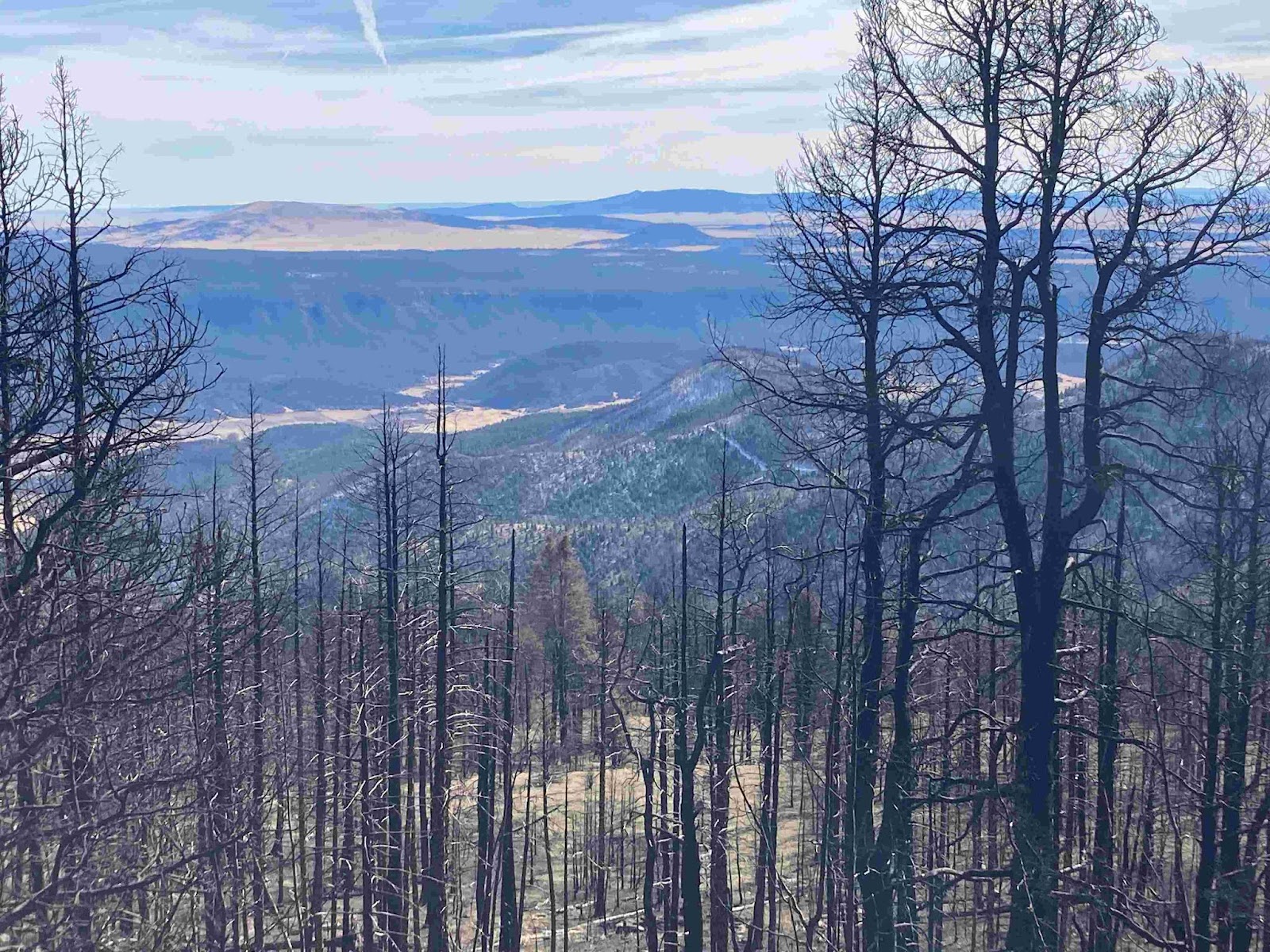
This forest is dead, but when alive it was deeply unhealthy. Note how close together the trees are, a normal condition in many parts of North America but not in the Southwest, where animals aren't adapted to it. Photo provided by Charles Curtin
But we weren’t really making much difference. We were a few dozen young people paid in pocket-change by charities and government programs interested in helping us build character. Unless somebody found a way to create a paying market for the stunted poles we cut, there would be no way to scale up the work. It seemed then a mere day-dream that anybody ever would figure it out. Except I’m thinking now that Charles and his colleagues have.
Not wanting to embarrass him again, I don’t say that. Instead I tell him about how, shortly after I left that job, one of the patches we thinned happened to be between an approaching wildfire and a small city—and the fire reached the thinned area and stopped.
But Charles tells me that thinned areas don’t stop fires anymore, because of climate change. Thinned areas do burn cooler, so the soil doesn’t cook and recovery is much faster, but in the drier, hotter conditions that are more common now, nothing stops the fires. In high winds, spot fires can spring up miles away.
'It’s a different world.'
'So again, that’s maybe a big lesson that increasingly with climate change, a lot of these [Indigenous] cultural practices are getting more important, as we have less and less free-board in our systems.'
How is climate change impacting your home area?
Again, he comments 'oh, interesting,' before he explains that, unlike some areas farther north, his region isn’t predicted to get less rainfall than it’s been getting, but warming temperatures mean the growing season is about two months longer, now. The longer warm season means the land dries out more, even if the amount of precipitation doesn’t change, what he calls functional drought. Drier land burns more easily, to the point that, across much of the region, the fire season now goes year-round, straining firefighting capacity badly. Meanwhile, as temperatures increase, plants and animals that live in the region’s mountains are already moving upslope, chasing the cooler climate they need. Eventually, they will run out of slope to go up. Some, like pikas—small, hamster-like relatives of rabbits—may go extinct.
But, once again, Charles says he’d rather focus on the positive. He says that since the fire, he’s been noticing streams that barely ran before now full of water.
'The rule of thumb, and this is very coarse, is that your average tree uses a hundred gallons of water a day. So multiply that by, I don’t know how many million trees, at a hundred times the [forest] density that historically existed, and that’s another functional drought factor. So by burning the land, we have a lot more water. So all the agriculture areas downstream, the trout streams, if they can avoid being silted up and destroyed by runoff—and that’s a big if—that can help mitigate the effects of climate change. So the fire’s not all "bad."' He makes air-quotes with his fingers.
What is the difference between not all bad and not all 'bad'? Charles rarely says or does anything without thinking about it, so those air-quotes must mean something, and anyway his eyes are twinkling again. I'll have to think about this.
In any case, in drawing attention to helpful consequences of the fire, he's not denying its tragedy—or that of climate change more generally. But tragedy and pain get few people moving, and Charles wants action. So maybe in returning to the positive again and again through this interview, he means to offer reasons for engagement, for courage, for hope.
How are these changes impacting people in your area?
'People are aware now of climate change in a way they weren’t a few years ago. People talk about it.'
He speculates that maybe they talk about it too much, given that they now refer to any unusually dry patch of weather as climate change. The region is in a long-term drought that is distinct from climate change and will presumably end at some point.
'But people are definitely aware. They can’t irrigate as easily, so in a lot of areas people just don’t try to grow crops where they historically did. So that’s definitely changing the nature of the communities here. New Mexico has these Acequias (ditch-irrigation systems brought to the New World by the Spanish—who in turn picked it up from the Moors), we have about seventy ditches all over the valley, and the ditches that have been here for hundreds of years are drying up. People are more and more aware. They’re not getting the hard freezes, so insects are worse. They’re not seeing the snow they used to. So it’s definitely in the collective consciousness.'
He spends some time explaining how the drought, plus a climate change-related shift in the timing of precipitation, from mostly in the summer to mostly in the winter, has been causing the desert he lives in to shift from a grassy to a more shrubby composition. His post-doc research was very much related to that shift, and he happily segues into discussing his earlier work.
'I ended up going from working on climate change [that is, studying it] to realising I could stand there and watch it or I could do something about it. We got to all sorts of creative and unusual partnerships. For example, turned out that while livestock can be quite damaging to the land, if you graze livestock in a way that emulates how bison used to graze, you can actually mitigate climate change.'
The mechanism that he uncovered was that cattle would preferentially eat the shrubs, returning the land to its grassy, pre-climate-change state.
'Of course, there’s wise stewardship involved, right? You have to think about how you do it, you don’t just throw cattle out there. But that’s a great example of how, with climate change, you get these strange—not bedfellows, strange collaborations. So I got into collaborating with ranchers who are, as we’ve said, mostly conservative. A decade earlier, they would have chased me off their land at gun-point. But they realised the landscape was changing, we realised the landscape was changing, and we had to partner together to make a difference. And that means withholding judgement. I was very anti-grazing. I was—'
And he makes a strange face, as though disturbed by his former self.
'Anti-a lot of things, and yet, I had to look and see, and oh, look, this land actually looks better under climate change, under certain grazing conditions. So again, that means you listen, you talk to people. What is it you did? What are you thinking about this? To me, as a scientist, often it’s a matter of taking that indigenous knowledge, that wealth of experience people have, and translating it into data, studying it, you don’t just take their word for it, you investigate it and apply it.
'So again, that’s maybe a big lesson that increasingly with climate change, a lot of these cultural practices are getting more important, whether it be indigenous ways of dealing with fire, indigenous ways of grazing, the way people steward the wildlife all these issues are getting more and important as we have less and less free-board [margin for error] in our systems.'
Together, we tangent off into the definition of the word 'healthy' and the relevance of values to the scientific process, and how important it is to be honest about what one’s values are, instead of claiming a degree of objectivity that real human beings don’t have. It’s an interesting discussion, but we’re really getting off-topic. Time to wrap up.
'Closing' Words—Sustaining the Fight in a World of Diminishing Resources
No set of questions, no matter how well-planned, can ever cover everything that I really want to hear—for one thing, there are usually things I don't even realise the interviewee knows. So my last question is always very open-ended.
His answer is almost as long as the whole interview prior.
Is there anything I should have asked about but didn’t?
Charles leans back, swivels around in his chair, thinking. Then he leans forward, closer to the camera, very seriously, to explain.
'How does a group like Extinction Rebellion expand and sustain themselves in a world of diminishing resources? Diminishing economic resources, diminishing societal resources? It’s hard because we’ve got this zero-sum game with more and more groups chasing fewer and fewer funds. And so, Extinction Rebellion comes along, or whatever the newest group is, if it’s just a matter of out-competing the next guy, what have we really accomplished?
'So, maybe one group is better than another in some way…. But I ask you to think more about, not how do you defend your own turf, but how do you raise all boats? That means collaborating across groups, that means finding innovative ways to fund things, whether it be partnerships with farmers, partnerships with indigenous peoples, alternative valuation systems, carbon credits, what have you. But to me, the future of conservation really relies on doing something very different than what we’ve been doing. I see the big barriers as being economic not ecological—and that’s a lot to swallow for this ecologist!
'I mean, a lot of conservation is, let’s face it, ecological imperialism. It’s wealthy elites spreading their version of reality on other people, very judgmental about it, but it’s also, within that, these groups, fighting for funds, for limited, declining funds.' He presses his fists together, illustrating the conflict. 'So how do we break that cycle? This, as I said, is ultimately the future of conservation.
'By the way, keep in mind, we’ve been in a weird period, right? Professional scientists have only existed for a hundred years. Professional naturalists, only a hundred years.'
By professional he means people earning their living that way. There were certainly scientists and naturalists more than a hundred years ago, but the vast majority of them were independently wealthy. Most of the others made their living by doing something other than scientific research. There wasn’t any money in science as such.
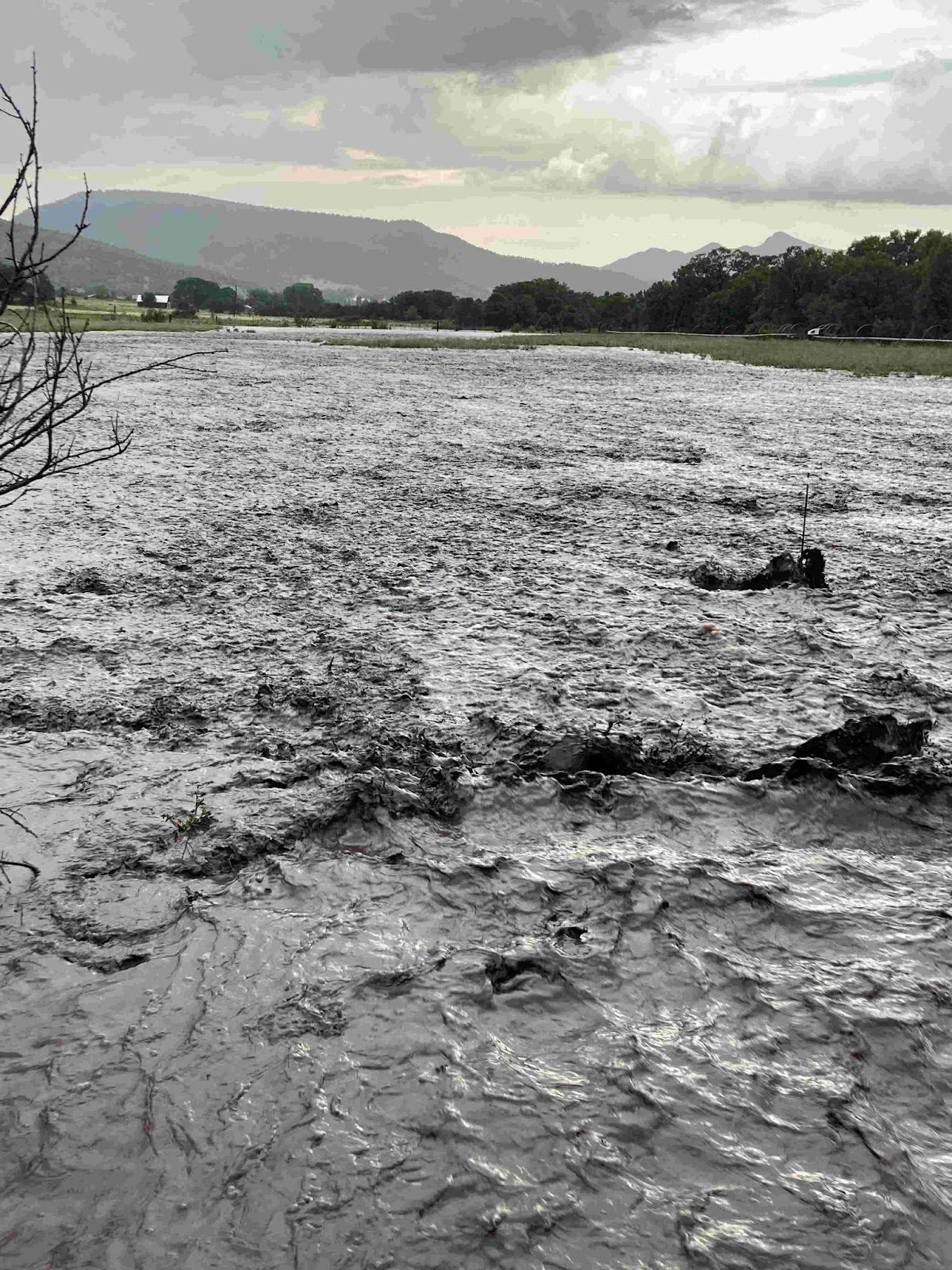
'Fire is the gift that keeps on giving,' said Charles of the destructive floods that began the rainy season after the fire. These floods are likely to keep recurring for several years. Photo provided by Charles Curtin
'These things we do to support what we do as conservationists, they’re very new and fleeting endeavours. We’ve had a very wealthy, very affluent society that allows people to be conservationists, that allows people to be scientists—and guilty as charged on both counts. Before that, it was only the elites, it was the wealthy, who went to Africa and decided oh, we’re going to make a park here, remove those people.'
He goes into character again and dismisses the natives with an imperiously lazy hand-wave.
'In the four or five-hundred-year history of conservation, maybe for a hundred years we’ve had the wealth for people to do it professionally? If we’re going to survive, we’ve got to do it differently, and what does that look like? It means thinking—not about resilience, how we go back and recapture what we had, but this term I like to use, prosilience, being forward-thinking, forward-dynamic. The dollar-driven world of conservation, it’s—follow the trend-lines, it’s nearing an end. And groups are going to have to be really creative about how they do their work, and how they partner, and how they create value. And that means really re-thinking how we do conservation, not just what’s in our hearts but in our heads, what’s going on in the six inches between our ears, reconceptualising our role.
'So, it’s tough. We’ve been in a period of immense privilege, of immense resources—not likely to continue. So how do we move forward? Cause we need conservation now more than ever. But it’s not going to look like our grandfathers’ conservation, or our fathers’. It’s gonna be a different animal. And what does that look like? That’s the challenge. Cause we can’t just do what other groups have done but try to do it better, because that’s not sustainable.'
He has been speaking very seriously, very plainly, with a quiet but certain confidence—but then he laughs, suddenly self-conscious, and adds 'At least not in my humble opinion.'
I agree, acknowledging that while XR isn’t exactly a conservation group in the same sense, we do rely on donations of not only money but time and labour. A lot of us are volunteers.
This is familiar territory for him.
'It’s hard. It’s an equity issue, like how much can you ask of people? Like, I work in conservation, you know, there’s a significant—you make a lot of sacrifices in this profession. In the end there’s the privilege of looking yourself in the mirror and knowing you did as much as you could, and that’s phenomenal. Not many people get to say that. But you also can’t ask people to not eat, not have children, and we’re not that far from that reality. It’s hard to sustain this work without thinking about….I’ve noticed, in my career, there’s been a marked decline in resources.'
He talks at length about ebbing of financial resources of all conservation groups, how even the most successful have lost 40% of their staff in the last few years alone. There is a shift, too, across the board, away from seasoned, experienced staff, towards younger people who cost less to employ.
'Where is that expertise going? Where is that guy or gal with twenty years of experience and deep craft going? I don’t know. I don’t know where they went. They’re just gone.'
Half a smile quirks his mouth, briefly. He explains that it’s taken him thirty years to understand these systems as well as he does, and he hopes to have another thirty years to use what he’s learned. So the whole idea of funding someone for eight years and then replacing them when they get expensive to employ is a real problem.
'We’re being forced to do something different, and that’s great. If we can create an abundant supply of energy that thins our forests, improves our watersheds, and empowers local people, what could be better?"
'When I began this work, I never thought—I thought it was going to be about ecology and community, but more and more it boils down to creative finance. How are we going to sustain these groups so they’ll be around for the next century, when they’re most needed? So I encourage people to really think through these issues. For example, carbon credits, if there are ways to have surcharges, if there are ways to...there are all kinds of innovative ways to fund this work. But people have to be willing to think about those creative solutions.'
We discuss the reasons for the ebb, and he cites the cultural shift away from philanthropy on the part of the wealthy, the erosion of the middle class, and the loss of affluence generally--what he doesn't say is that this loss is itself a symptom of environmental degradation, a sign that the wealth realised by liquidating our planet's resources may be starting to run out. He doesn't say it, but why else would he keep emphasising that the latter half of the twentieth century was more affluent than the world will likely ever be again?
He talks about his daughter, who is in her thirties, 'giving herself to conservation, to something larger than herself. She doesn’t really expect to have a home. People of her generation don’t plan on having a home, a Labrador, and 2.4 kids, they don’t see that as being open to them.'
He says this with the same interested, engaged, but almost impersonal manner as the rest of his comments. The sunlight through the door behind him has gone diffuse, is fading.
'But again it’s not necessarily bad. The money was never free—philanthropists have agendas. Again, coming back to community empowerment, if a community can create a biomass energy plant, the energy plant takes the excess trees, creates carbon credits, creates biochar, the biochar goes to improve local farms and the soil and the ecosystem, the by-product of electricity goes to support local people in a way that’s off the grid, you’re creating a whole alternative economy that empowers the local people and gets them away from the constraints that they face.'
This hypothetical, of course, is exactly what he and his partners are trying to achieve.
'I don’t mean to say it’s doom and gloom. We’re being forced to do something different, and that’s great. If we can create an abundant supply of energy that thins our forests, improves our watersheds, and empowers local people, what could be better? You’ll have a remote little community in New Mexico selling carbon credits, selling electricity back to the grid, thinning their own forests, using the money to set up educational programs so that kids who don’t want to go work at a call centre or in Silicon Valley can stay home and do logging or stay and do farming, the water goes into organic agriculture, and you create a circular economy—and that circular economy, to me is the future. But it ain’t what we’ve been doing!'
I giggle over his jaunty delivery of that last line. 'Fun stuff,' he adds, acknowledging my giggle, and shifts a bit in his chair before leaning forward again.
'I encourage you to look up circular economy on the Capital Institute’s website and the work of Regensis, the Regen Network and Carbonface. There are a number of groups doing really neat, really innovative work. The exciting thing will be when groups like Extinction Rebellion meet groups like the Regen Network and groups doing circular economy work come together—and they will, cause they’ll have to—THEN you’ve got some really cool stuff.'
It’s obviously his intended last line. It’s a good line. We grin, pleased with ourselves, and chat briefly about other matters. The light is almost gone now from the doorway behind him. A click on a mouse-pad, and the magic of Zoom is over.
